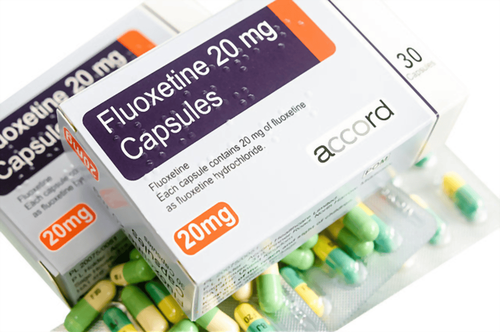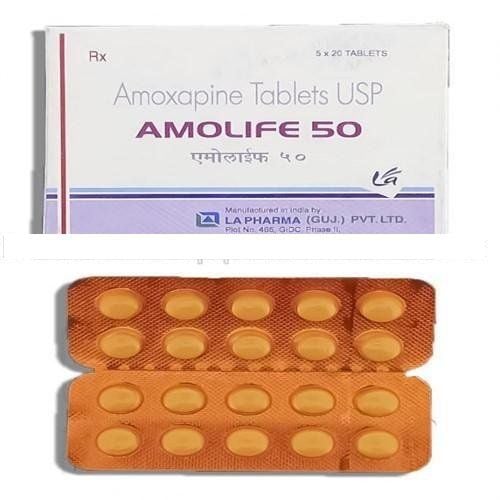This is an automatically translated article.
Fluvoxamine is a medication used to treat obsessive-compulsive disorder (OCD). It helps to reduce nagging/unwanted thoughts (obsessions) and urges to perform repetitive tasks (such as compulsive counting, hand washing, checking) that interfere with daily life. Fluvoxamine is a selective serotonin reuptake inhibitor (SSRI), which helps restore the balance of serotonin in the brain.1. In what cases is Fluvoxamine indicated?
Fluvoxamine is indicated in the following cases:Bipolar disorder Depression Obsessive-compulsive disorder Post-traumatic stress syndrome Repetitive episodes of anxiety Depression-related anxiety Eating disorder Binge drinking Fluvoxamine is contraindicated in the following cases:
Disorders caused by excess antidiuretic hormones Low blood sodium levels Increased bleeding risk Manic behavior Manic episodes Suicidal thoughts Serotonin syndrome Glaucoma Closed angle Liver disease Bleeding from the stomach, esophagus or duodenum Convulsions Smoking Cigarette poor CYP2D6 Metaboliser Risk of angle-closure glaucoma due to narrowing of the anterior angle of the eye chamber.
2. How to use Fluvoxamine
Read the medication instructions provided by your doctor carefully before you start taking fluvoxamine and each time you are given a refill. Take Fluvoxamine by mouth with or without food as directed by your doctor, usually once daily at bedtime, or twice daily (once in the morning and once at bedtime). . If you are taking Fluvoxamine twice daily and the doses are not equal, a larger dose should be taken at bedtime. The dose of Fluvoxamine is calculated based on your medical condition, response to treatment, age, and other medications you are taking. In children, the dose of Fluvoxamine can also be calculated based on their age and sex. Your doctor may direct you to start taking Fluvoxamine at a low dose and gradually increase your dose, to reduce your risk of side effects. Do not increase your dose of Fluvoxamine on your own or use Fluvoxamine more often or for longer than prescribed. Doing so will not help your condition improve faster, but will also increase your risk of side effects. Take Fluvoxamine regularly to get the most benefit from it. To avoid forgetting to take your medication, take it at the same time(s) each day. Even if you feel well, you still need to keep taking Fluvoxamine. You should consult your doctor before stopping using the drug. Some conditions may get worse when fluvoxamine is stopped suddenly. In addition, you may experience symptoms such as mood swings, fatigue, headaches, sleep changes, and a brief feeling similar to an electric shock when the medication is stopped abruptly. To prevent these symptoms while you are stopping treatment with Fluvoxamine, your doctor may reduce your dose gradually. It may take up to several weeks for you to get the full benefits of Fluvoxamine. Tell your doctor if your condition does not improve or if it worsens after using Fluvoxamine.
Thuốc Fluvoxamine chống chỉ định với người đang hút thuốc lá
3. Fluvoxamine side effects
While using Fluvoxamine, you may experience nausea, vomiting, drowsiness, dizziness, loss of appetite, trouble sleeping, weakness, and sweating. If any of these side effects persist or get worse, tell your doctor right away.Remember that your doctor has prescribed Fluvoxamine because they have judged that the benefit to you outweighs the risk of side effects. Many people use Fluvoxamine without any serious side effects.
Tell your doctor right away if you have any serious side effects of Fluvoxamine, including: Easy bruising/bleeding, tremors, decreased sexual interest/ability.
Get medical help right away if you have any very serious side effects of Fluvoxamine, including: Fainting, vomit that looks like coffee grounds, black stools, seizures, sore eyes or swelling or redness, dilated pupils, changes in vision.
Fluvoxamine can increase serotonin, but rarely causes a very serious condition called serotonin syndrome. This risk increases if you are also taking other medications that increase serotonin, so tell your doctor about all the medicines you take. If you have any of the following symptoms: Tachycardia, hallucinations, loss of coordination, severe dizziness, severe nausea or vomiting/diarrhea, unexplained fever, muscle twitching, unusual restlessness , get medical help right away.
Rarely, men may experience pain or an erection lasting more than 4 hours while using Fluvoxamine. If this happens, stop using this medicine and get medical help right away.
A very serious allergic reaction to Fluvoxamine is very rare. However, if you notice any of these symptoms of a serious allergic reaction to Fluvoxamine, including: rash, itching/swelling (especially of the face/tongue/throat), severe dizziness, difficulty breathing, seek medical help immediately.
Below are Fluvoxamine side effects by likelihood.
Common side effects of Fluvoxamine include:
Abnormal sexual function Difficulty sleeping Diarrhea Problems with ejaculation Common cold Nasal congestion and runny nose Dry mouth Indigestion Constipation Drowsiness Dizziness Dizziness excessive sweating Muscle tremors Muscle twitching Loss of appetite Decreased appetite Headache Nausea Anxiety Fatigue Uncommon side effects of Fluvoxamine include:
Manic behavior Depression Muscle tremors Fainting Difficulty Breathing Difficulty swallowing Mood swings Changes in sexual preferences A dental disease Inability to get an erection Muscle pain Leg cramps Chills Facial and neck redness Temporary weight gain Weight loss Heart pounding Yawning Vomiting Full Abdominal Increased need to urinate often Excessive urination Feelings of irritability Anxiety Rare side effects of Fluvoxamine include:
Low blood sodium levels Porphyrin metabolism disorders Low blood count due to bone marrow failure Anemia Large purple or brown skin spots Suicidal behavior Suicidal thoughts Thoughts of hurting or killing someone Other Excitement Hostility Parkinson's Extrapyramidal Disease Neuroleptic Malignant Syndrome Serotonin Syndrome Blurred Vision Ventricular Tachycardia Torsades de pointes QT interval prolongation on electrocardiogram Vasculitis Low blood pressure Bleeding Subcutaneous bruising Obstruction Intestinal decreased motility Hepatitis Gastrointestinal or intestinal bleeding Bloody urine Toxic epidermal necrolysis Stevens-Johnson syndrome Rhabdomyolysis Changes in mental status Hallucinations Convulsions Fever Restlessness feeling unable to sit still Movement disorders Anaphylaxis Angioedema Secondary angle-closure glaucoma Lung tissue problems Pancreatitis Abnormal muscle movements Aggressive behavior Pupil dilation Laryngeal constriction Gastroesophageal reflux disease Pulling menstruation prolonged or heavy bleeding Bleeding unrelated to menstruation A problem with menstruation Skin more sensitive to sunlight Leech nests Tiny red pinheads on the skin Emotional disorders Nosebleeds Orgasm problems unusual dreams Blood in semen This is not a complete list of side effects possible side effects of Fluvoxamine. If you notice other effects of Fluvoxamine not listed above, contact your doctor for prompt action.

Bạn có thể cảm thấy buồn nôn khi đang sử dụng thuốc Fluvoxamine
4. Precautions for Fluvoxamine side effects
Before taking fluvoxamine, tell your doctor if you are allergic to this medicine and any other allergies, if any. Fluvoxamine may contain inactive ingredients, and they may cause allergic reactions or other problems.Before using Fluvoxamine, tell your doctor your medical history, especially of: Personal or family history of bipolar disorder, suicide attempts, liver problems, seizures, sodium in your blood. low blood pressure, intestinal ulcers/bleeding (peptic ulcer disease) or bleeding problems, personal or family history of glaucoma (angle-closure type).
Fluvoxamine can make you dizzy or drowsy and alcohol and marijuana can make you more dizzy or drowsy. While taking Fluvoxamine you should not drive, use machines, or do anything that requires alertness, until you can do it safely. Avoid alcoholic beverages and do not use marijuana while being treated with Fluvoxamine.
Fluvoxamine may cause QT prolongation, affecting heart rate. The risk of QT prolongation may be increased if you have certain medical conditions or are taking other medicines that can cause QT prolongation. Before using fluvoxamine, tell your doctor or pharmacist of all medicines you use and if you have any of the following conditions: Certain heart problems (such as heart failure, slow heartbeat, QT interval). prolonged in ECG), family history of heart disease.
Before surgery, tell your doctor or dentist that you are being treated with Fluvoxamine.
Older adults may be more sensitive to the side effects of fluvoxamine, especially bleeding, or loss of coordination, and QT prolongation. Older adults may also be more susceptible to salt imbalance (hyponatremia), especially if they are taking diuretics. Loss of coordination can increase the risk of falls.
Children may be more sensitive to the side effects of Fluvoxamine, especially loss of appetite and weight loss. Monitor weight and height in children taking this medicine.
For women during pregnancy, Fluvoxamine should only be used when clearly needed. This is because it can harm the unborn baby and babies born to mothers who have used Fluvoxamine during the last 3 months of pregnancy with withdrawal symptoms such as difficulty sucking/breathing, convulsions, muscle stiffness or irritability. crying continuously, although this is very rare.
Untreated mental/mood problems (such as depression, obsessive-compulsive disorder, post-traumatic stress disorder) can be a serious condition, only stopping the medication Fluvoxamine when your doctor tells you to. If you are planning to become pregnant, are pregnant, or think you may be pregnant, discuss with your doctor right away the benefits and risks of using Fluvoxamine during pregnancy.
Fluvoxamine passes into breast milk and may have unwanted effects on a newborn baby. Therefore, women who are breast-feeding should consult their doctor before using Fluvoxamine.

Hãy thông báo với bác sĩ các loại thuốc bạn đang sử dụng trước khi được kê Fluvoxamine
5. Fluvoxamine drug interactions
Drug interactions can change the way Fluvoxamine works or increase your risk of serious side effects. Make a list of all the medications you take (including prescription/nonprescription drugs and herbal products) and share it with your doctor. Do not start, stop, or change the dose of any medicine while you are using Fluvoxamine, without your doctor's approval. Some drugs that may interact with Fluvoxamine include: Other drugs that can cause bleeding/bruising (including antiplatelet drugs such as clopidogrel; anticoagulants such as warfarin, NSAIDs such as ibuprofen).Aspirin may increase the risk of bleeding when used with Fluvoxamine. However, if your doctor has directed you to take low-dose aspirin to prevent a heart attack or stroke, you should continue to use it unless your doctor tells you otherwise.
Many drugs besides fluvoxamine can affect heart rate (QT prolongation), including pimozide, thioridazine, among others.
Fluvoxamine may slow the removal of other medicines from your body, which may affect how they work. Such drugs include alosetron, clozapine, methadone, ramelteon, tacrine, tizanidine, melatonin; certain benzodiazepines such as alprazolam, diazepam, triazolam; some beta blockers such as metoprolol, propranolol; tricyclic antidepressants such as imipramine.
Taking an MAO inhibitor with Fluvoxamine can cause serious drug interactions that can even be fatal. Avoid taking MAO inhibitors (isocarboxazid, methylene blue, moclobemide, phenelzine, procarbazine, rasagiline, safinamide, linezolid, selegiline, tranylcypromine) during treatment and also for two weeks before and after treatment with this medicine.
The risk of serotonin syndrome is increased if you are also taking other drugs that increase serotonin including street drugs such as MDMA/"ecstasy", St. John's wort, some antidepressants, tryptophan, and some others.
Tell your doctor or pharmacist if you are taking other products that cause drowsiness including alcohol, marijuana, antihistamines (such as cetirizine, diphenhydramine), muscle relaxants, and opioid pain relievers (such as codeine). , sleeping or anxiety medication (such as alprazolam, diazepam, zolpidem).
Tobacco reduces the concentration of Fluvoxamine in the blood. Tell your doctor if you smoke or if you have recently stopped smoking before using this medicine.
Fluvoxamine may interfere with certain tests including brain scans for Parkinson's disease, possibly causing false test results. Make sure laboratory staff and all your doctors know you use Fluvoxamine.

Thuốc Fluvoxamine có thể gây ảnh hưởng đến kết quả một số xét nghiệm
6. What to do if you overdose or forget to use Fluvoxamine?
If you or someone else has overdosed on Fluvoxamine and has serious symptoms such as fainting or difficulty breathing, call 911. Symptoms of a Fluvoxamine overdose may include: fast/slow heartbeat / irregularity, difficulty breathing, convulsions.If you miss a dose of Fluvoxamine, take it as soon as you remember. If it is almost time for your next dose of Fluvoxamine, skip the missed dose. Use your next dose of Fluvoxamine at the usual time and do not double the usual dose.
7. How to store Fluvoxamine
Store Fluvoxamine at room temperature, away from light and moisture. Do not store Fluvoxamine in the bathroom, keep it away from children and pets. Dispose of this medication appropriately when it has expired or is no longer needed.Please dial HOTLINE for more information or register for an appointment HERE. Download MyVinmec app to make appointments faster and to manage your bookings easily.
Reference source: webmd.com












